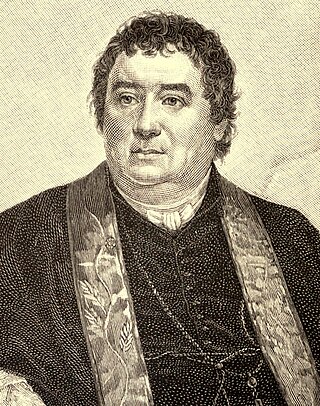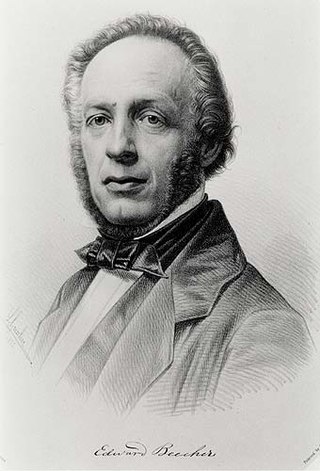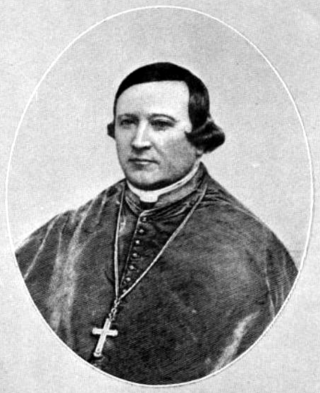Related Research Articles

Maria Monk was a Canadian woman whose book Awful Disclosures of Maria Monk, or, The Hidden Secrets of a Nun’s Life in a Convent Exposed (1836) claimed to expose systematic sexual abuse of nuns and infanticide of the resulting children by Catholic priests in her convent in Montreal. The book is considered by scholars to be an anti-Catholic hoax.

Lyman Beecher was a Presbyterian minister, and the father of 13 children, many of whom became writers or ministers, including Harriet Beecher Stowe, Henry Ward Beecher, Charles Beecher, Edward Beecher, Isabella Beecher Hooker, Catharine Beecher, and Thomas K. Beecher.

The Monk: A Romance is a Gothic novel by Matthew Gregory Lewis, published in 1796. Written early in Lewis's career, it was published before he turned twenty. In one letter, he claimed to have written it in ten weeks, but other correspondence suggests that he had at least started it, or something similar, a couple of years earlier. It is a prime example of the type of Gothic that specializes in horror.

Anti-Catholicism is hostility towards Catholics and opposition to the Catholic Church, its clergy, and its adherents. At various points after the Reformation, some majority-Protestant states, including England, Northern Ireland, Prussia, Scotland, and the United States, turned anti-Catholicism, opposition to the authority of Catholic clergy (anti-clericalism), opposition to the authority of the pope (anti-papalism), mockery of Catholic rituals, and opposition to Catholic adherents into major political themes and policies of religious discrimination and religious persecution. Major examples of groups that have targeted Catholics in recent history include Ulster loyalists in Northern Ireland during the Troubles and the second Ku Klux Klan in the United States. The anti-Catholic sentiment which resulted from this trend frequently led to religious discrimination against Catholic communities and individuals and it occasionally led to the religious persecution of them. Historian John Wolffe identifies four types of anti-Catholicism: constitutional-national, theological, popular and socio-cultural.

The Ursuline Convent riots occurred August 11 and 12, 1834, in Charlestown, Massachusetts, near Boston, in what is now Somerville, Massachusetts. During the riot, a convent of Roman Catholic Ursuline nuns was burned down by a Protestant mob. The event was triggered by reported abuse of a member of the order, and was fueled by the rebirth of extreme anti-Catholic sentiment in antebellum New England.

John England was an Irish-born American prelate of the Catholic Church. He served as the first Bishop of Charleston, leading a diocese that then covered three Southern states.

Jean-Louis Anne Madelain Lefebvre de Cheverus was a French Roman Catholic bishop and later cardinal.
The Catholic Sentinel was the newspaper of the Archdiocese of Portland. It was published by Oregon Catholic Press, which also published El Centinela, the Spanish-language version of the Catholic Sentinel. The Catholic Sentinel published an online edition from 1996 to 2022. In 2022, it was announced that both the Sentinel and El Centinela would be discontinued as of October 1, 2022.

Benedict Joseph Fenwick was an American Catholic prelate, Jesuit, and educator who served as the Bishop of Boston from 1825 until his death in 1846. In 1843, he founded the College of the Holy Cross in Worcester, Massachusetts. Prior to that, he was twice the president of Georgetown College and established several educational institutions in New York City and Boston.
John Thayer was the first native of New England ordained to the Roman Catholic priesthood. He was born in Boston, Massachusetts. Thayer was educated at Yale College and was a Protestant in his early life. He was ordained as a Congregationalist minister and served as a chaplain during the American Revolutionary War. While visiting Rome in 1783, he converted to the Roman Catholic faith, an act which caused a sensation in New England at the time. He credited his conversion to miracles attributed to the noted mendicant, Saint Benedict Joseph Labre, who lived and died there in that period.
The Broad Street Riot was a massive brawl that occurred in Boston, Massachusetts, on June 11, 1837, between Irish Americans and Yankee firefighters. An estimated 800 people were involved in the actual fighting, with at least 10,000 spectators egging them on. Nearby homes were sacked and vandalized, and the occupants beaten. Many on both sides were seriously injured, but no immediate deaths resulted from the violence. After raging for hours, the riot was quelled when Mayor Samuel Eliot called in the state militia.

Edward Beecher was an American theologian, the son of Lyman Beecher and the brother of Harriet Beecher Stowe and Henry Ward Beecher.
Anti-Catholicism in the United States concerns the anti-Catholic attitudes which were first brought to the Thirteen Colonies by Protestant European settlers, mostly composed of English Puritans, during the British colonization of North America. Two types of anti-Catholic rhetoric existed in colonial society and they continued to exist during the following centuries. The first type, derived from the theological heritage of the Protestant Reformation and the European wars of religion, consisted of the biblical Anti-Christ and the Whore of Babylon variety and it dominated anti-Catholic thought until the late 17th century. The second type was a variety which was partially derived from xenophobic, ethnocentric, nativist, and racist sentiments and distrust of increasing waves of Catholic immigrants, particularly immigrants from Ireland, Italy, Poland, Germany, Austria and Mexico. It usually focused on the pope's control of bishops, priests, and deacons.
Virgil Horace Barber was an American Jesuit.

Anti-Catholicism in the United Kingdom dates back to the martyrdom of Saint Alban in Roman times. Attacks on the Church from a Protestant angle mostly began with the English and Irish Reformations which were launched by King Henry VIII and the Scottish Reformation which was led by John Knox. Within England, the Act of Supremacy 1534 declared the English crown to be "the only supreme head on earth of the Church in England" in place of the Pope. Any act of allegiance to the latter was considered treasonous because the papacy claimed both spiritual and political power over its followers. Ireland was brought under direct English control starting in 1536 during the Tudor conquest of Ireland. The Scottish Reformation in 1560 abolished Catholic ecclesiastical structures and rendered Catholic practice illegal in Scotland. Today, anti-Catholicism remains common in the United Kingdom, with particular relevance in Scotland and Northern Ireland.

Bernard O'Reilly was an Irish-born prelate of the Roman Catholic Church. Known for his service during the 1832 cholera outbreak in New York, he later served as Bishop of Hartford from 1850 until his death in 1856.
The Catholic Church has been criticised in fiction, such as literature, film and television. Polemics have also been written on the Church and its practices. Some examples are the anti-Catholic stereotypes that filled Gothic fiction of Anglican England, the films of Luis Buñuel who took issue with the Church in Spain, the humor of some US television pundits like Rosie O'Donnell, and the rhetoric of some fundamentalist preachers.
Charlestown Female Seminary was a Christian school in Charlestown, Massachusetts. Opened in 1830, the female seminary was the second school in Charlestown for young women.

East Somerville is a neighborhood in the eastern part of the city of Somerville, Massachusetts, United States. The community stretches east along Broadway, from Massachusetts Route 28 to Sullivan Square and Interstate 93 on the city line with the Boston neighborhood of Charlestown.
Rebecca Theresa Reed (1813-1838) was an American escaped nun and author of the memoir Six Months in a Convent, which influenced the first of many anti-Catholic waves. Reed’s book vividly describes her experience in an Ursuline convent and has sold thousands of copies. Her writing inspired people like Maria Monk to speak out about their mistreatment in the Roman Catholic Church.
References
- ↑ Barnes and Noble review
- ↑ Franchot, 145, citing Whitney, 53.[ full citation needed ]
- ↑ An answer to Six months in a convent, exposing its falsehoods and manifold absurdities